The Impact of Festivals and Events on Sustainable Development
VerifiedAdded on 2020/10/22
|9
|2218
|411
Report
AI Summary
This report delves into the multifaceted impact of festivals and events on sustainable development. It highlights the crucial role of sustainability in the tourism and events industry, emphasizing the need to minimize environmental harm and promote resource efficiency. The report explores the positive impacts of mega-events, such as the 2010 FIFA World Cup in South Africa and the Olympic Games, demonstrating how these events can drive economic growth, social development, and infrastructure improvements. It also acknowledges the potential negative consequences, including price inflation, environmental concerns, and social disruptions. The report further examines the role of international organizations like ISO and GRI in establishing sustainability standards and guidelines for event planning. The conclusion emphasizes the advantageous nature of hosting sustainable mega-events, which can enhance international brand image and attract foreign investment, while acknowledging the need to address issues such as temporality and resource limitations. Overall, the report underscores the importance of careful planning and execution to maximize the benefits of festivals and events while minimizing their adverse effects, contributing to a more sustainable future.
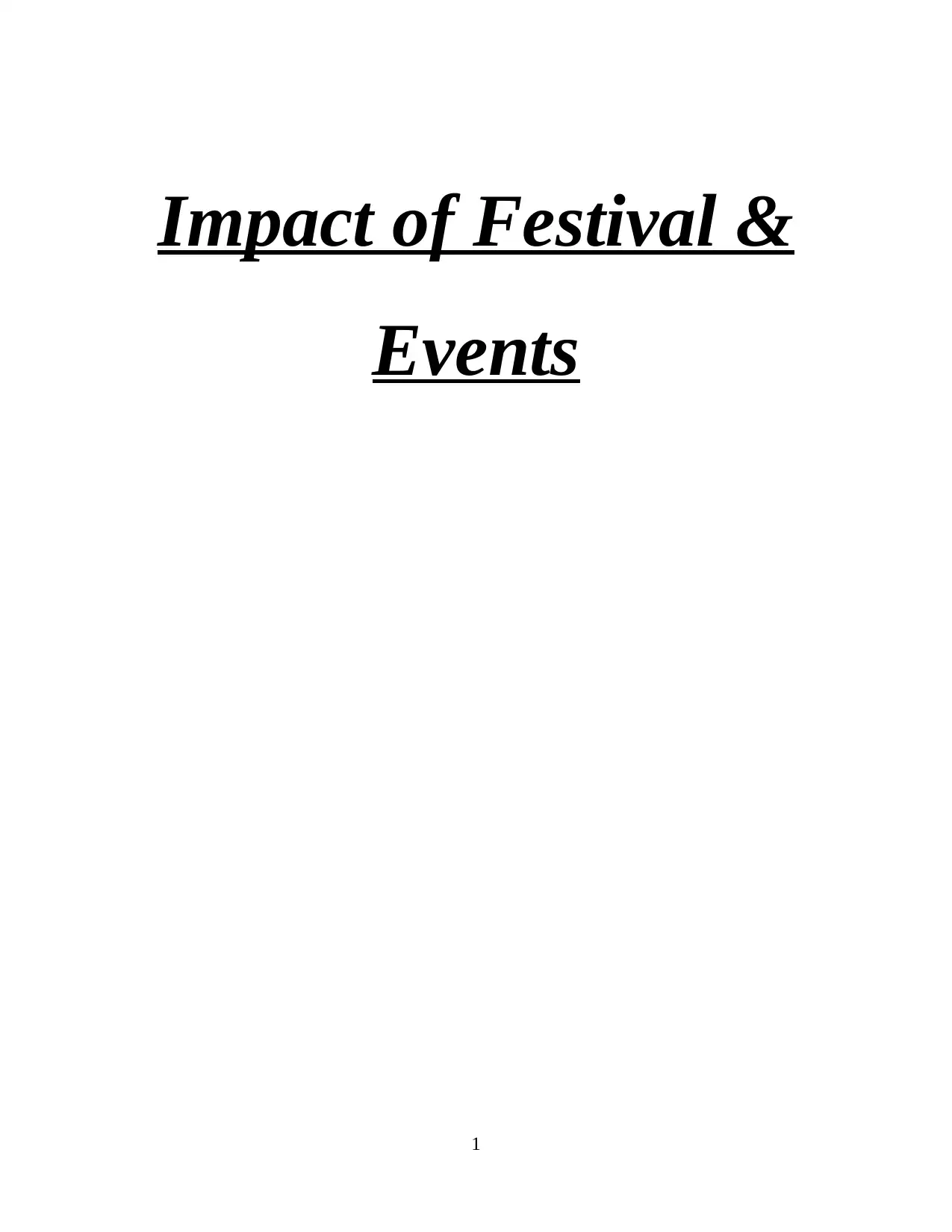
Impact of Festival &
Events
1
Events
1
Paraphrase This Document
Need a fresh take? Get an instant paraphrase of this document with our AI Paraphraser
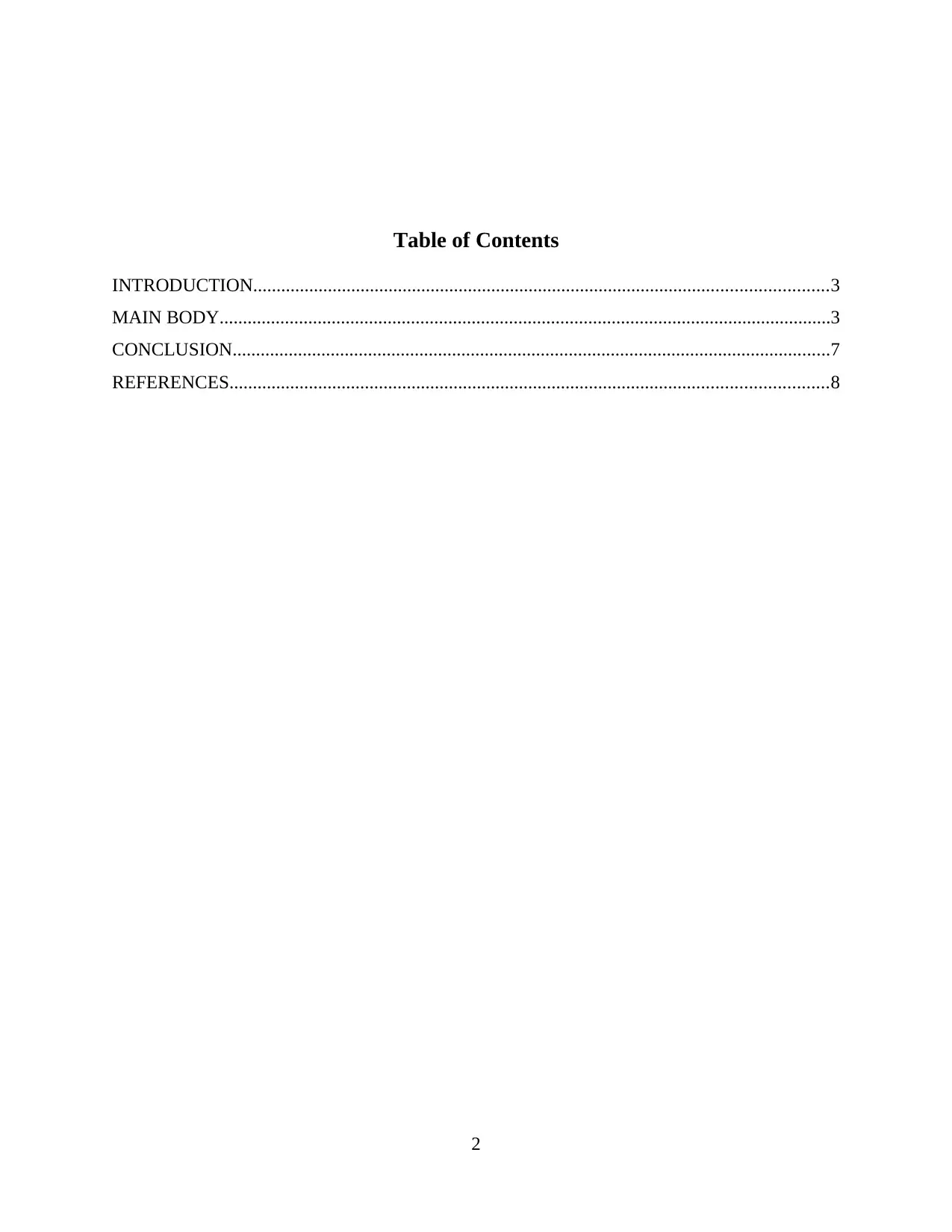
Table of Contents
INTRODUCTION...........................................................................................................................3
MAIN BODY...................................................................................................................................3
CONCLUSION................................................................................................................................7
REFERENCES................................................................................................................................8
2
INTRODUCTION...........................................................................................................................3
MAIN BODY...................................................................................................................................3
CONCLUSION................................................................................................................................7
REFERENCES................................................................................................................................8
2
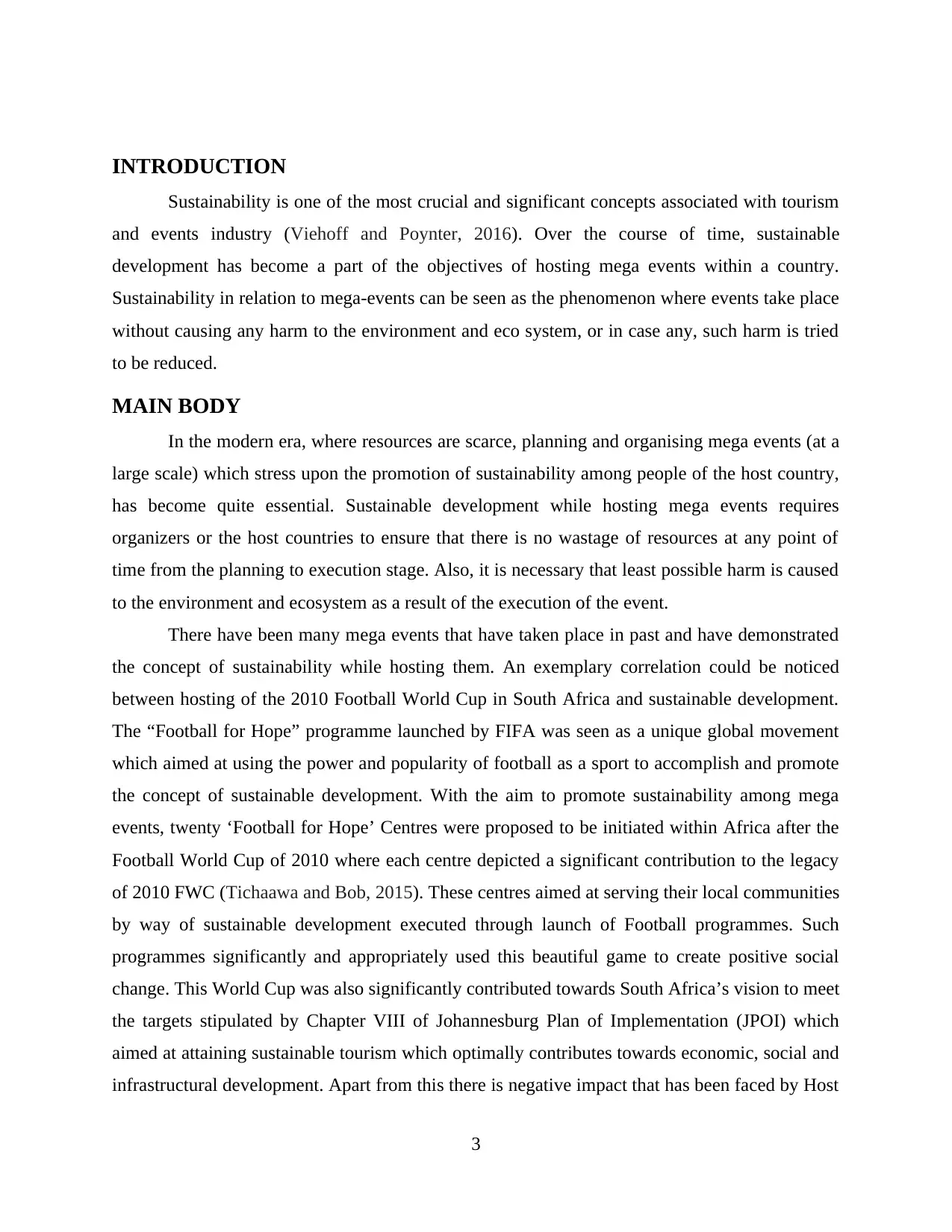
INTRODUCTION
Sustainability is one of the most crucial and significant concepts associated with tourism
and events industry (Viehoff and Poynter, 2016). Over the course of time, sustainable
development has become a part of the objectives of hosting mega events within a country.
Sustainability in relation to mega-events can be seen as the phenomenon where events take place
without causing any harm to the environment and eco system, or in case any, such harm is tried
to be reduced.
MAIN BODY
In the modern era, where resources are scarce, planning and organising mega events (at a
large scale) which stress upon the promotion of sustainability among people of the host country,
has become quite essential. Sustainable development while hosting mega events requires
organizers or the host countries to ensure that there is no wastage of resources at any point of
time from the planning to execution stage. Also, it is necessary that least possible harm is caused
to the environment and ecosystem as a result of the execution of the event.
There have been many mega events that have taken place in past and have demonstrated
the concept of sustainability while hosting them. An exemplary correlation could be noticed
between hosting of the 2010 Football World Cup in South Africa and sustainable development.
The “Football for Hope” programme launched by FIFA was seen as a unique global movement
which aimed at using the power and popularity of football as a sport to accomplish and promote
the concept of sustainable development. With the aim to promote sustainability among mega
events, twenty ‘Football for Hope’ Centres were proposed to be initiated within Africa after the
Football World Cup of 2010 where each centre depicted a significant contribution to the legacy
of 2010 FWC (Tichaawa and Bob, 2015). These centres aimed at serving their local communities
by way of sustainable development executed through launch of Football programmes. Such
programmes significantly and appropriately used this beautiful game to create positive social
change. This World Cup was also significantly contributed towards South Africa’s vision to meet
the targets stipulated by Chapter VIII of Johannesburg Plan of Implementation (JPOI) which
aimed at attaining sustainable tourism which optimally contributes towards economic, social and
infrastructural development. Apart from this there is negative impact that has been faced by Host
3
Sustainability is one of the most crucial and significant concepts associated with tourism
and events industry (Viehoff and Poynter, 2016). Over the course of time, sustainable
development has become a part of the objectives of hosting mega events within a country.
Sustainability in relation to mega-events can be seen as the phenomenon where events take place
without causing any harm to the environment and eco system, or in case any, such harm is tried
to be reduced.
MAIN BODY
In the modern era, where resources are scarce, planning and organising mega events (at a
large scale) which stress upon the promotion of sustainability among people of the host country,
has become quite essential. Sustainable development while hosting mega events requires
organizers or the host countries to ensure that there is no wastage of resources at any point of
time from the planning to execution stage. Also, it is necessary that least possible harm is caused
to the environment and ecosystem as a result of the execution of the event.
There have been many mega events that have taken place in past and have demonstrated
the concept of sustainability while hosting them. An exemplary correlation could be noticed
between hosting of the 2010 Football World Cup in South Africa and sustainable development.
The “Football for Hope” programme launched by FIFA was seen as a unique global movement
which aimed at using the power and popularity of football as a sport to accomplish and promote
the concept of sustainable development. With the aim to promote sustainability among mega
events, twenty ‘Football for Hope’ Centres were proposed to be initiated within Africa after the
Football World Cup of 2010 where each centre depicted a significant contribution to the legacy
of 2010 FWC (Tichaawa and Bob, 2015). These centres aimed at serving their local communities
by way of sustainable development executed through launch of Football programmes. Such
programmes significantly and appropriately used this beautiful game to create positive social
change. This World Cup was also significantly contributed towards South Africa’s vision to meet
the targets stipulated by Chapter VIII of Johannesburg Plan of Implementation (JPOI) which
aimed at attaining sustainable tourism which optimally contributes towards economic, social and
infrastructural development. Apart from this there is negative impact that has been faced by Host
3
⊘ This is a preview!⊘
Do you want full access?
Subscribe today to unlock all pages.

Trusted by 1+ million students worldwide
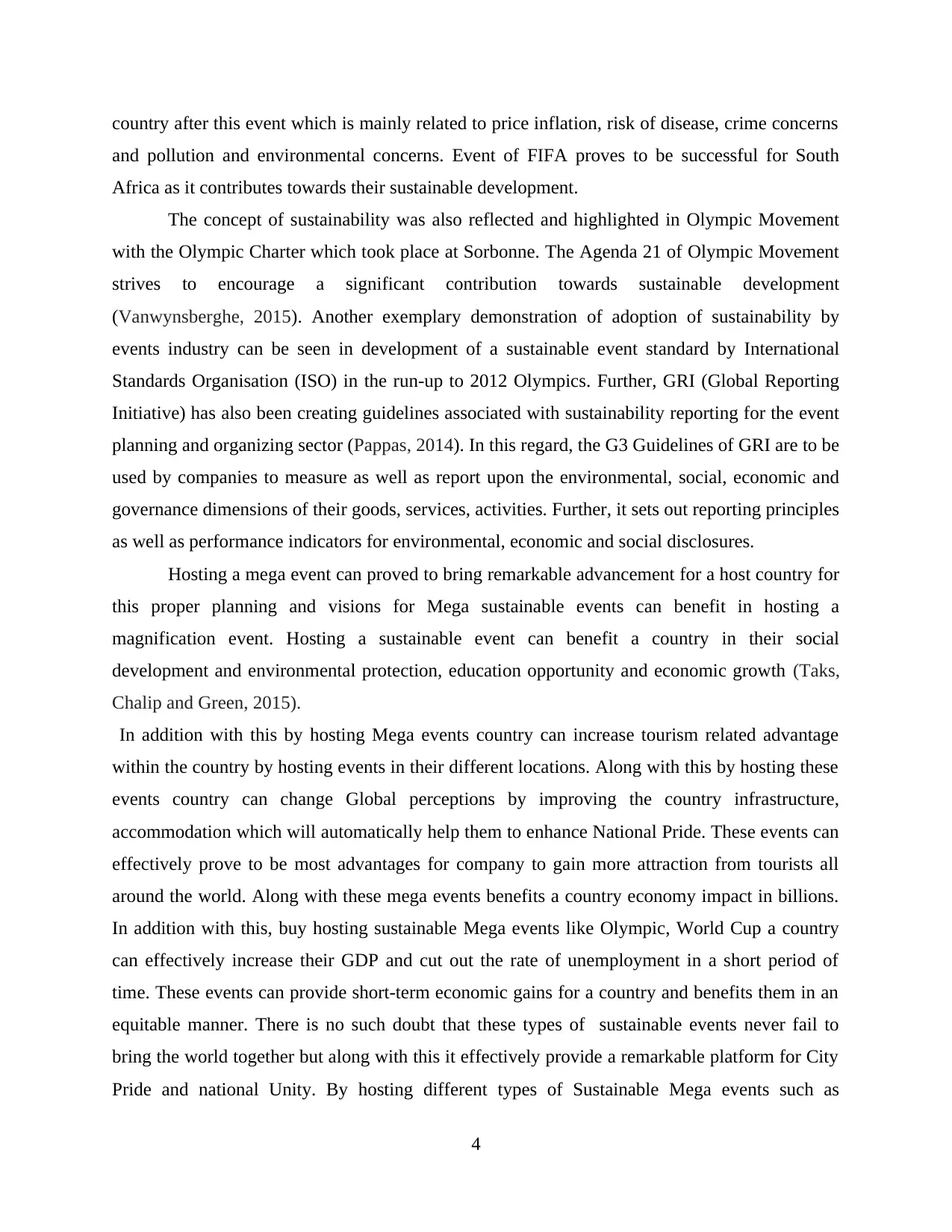
country after this event which is mainly related to price inflation, risk of disease, crime concerns
and pollution and environmental concerns. Event of FIFA proves to be successful for South
Africa as it contributes towards their sustainable development.
The concept of sustainability was also reflected and highlighted in Olympic Movement
with the Olympic Charter which took place at Sorbonne. The Agenda 21 of Olympic Movement
strives to encourage a significant contribution towards sustainable development
(Vanwynsberghe, 2015). Another exemplary demonstration of adoption of sustainability by
events industry can be seen in development of a sustainable event standard by International
Standards Organisation (ISO) in the run-up to 2012 Olympics. Further, GRI (Global Reporting
Initiative) has also been creating guidelines associated with sustainability reporting for the event
planning and organizing sector (Pappas, 2014). In this regard, the G3 Guidelines of GRI are to be
used by companies to measure as well as report upon the environmental, social, economic and
governance dimensions of their goods, services, activities. Further, it sets out reporting principles
as well as performance indicators for environmental, economic and social disclosures.
Hosting a mega event can proved to bring remarkable advancement for a host country for
this proper planning and visions for Mega sustainable events can benefit in hosting a
magnification event. Hosting a sustainable event can benefit a country in their social
development and environmental protection, education opportunity and economic growth (Taks,
Chalip and Green, 2015).
In addition with this by hosting Mega events country can increase tourism related advantage
within the country by hosting events in their different locations. Along with this by hosting these
events country can change Global perceptions by improving the country infrastructure,
accommodation which will automatically help them to enhance National Pride. These events can
effectively prove to be most advantages for company to gain more attraction from tourists all
around the world. Along with these mega events benefits a country economy impact in billions.
In addition with this, buy hosting sustainable Mega events like Olympic, World Cup a country
can effectively increase their GDP and cut out the rate of unemployment in a short period of
time. These events can provide short-term economic gains for a country and benefits them in an
equitable manner. There is no such doubt that these types of sustainable events never fail to
bring the world together but along with this it effectively provide a remarkable platform for City
Pride and national Unity. By hosting different types of Sustainable Mega events such as
4
and pollution and environmental concerns. Event of FIFA proves to be successful for South
Africa as it contributes towards their sustainable development.
The concept of sustainability was also reflected and highlighted in Olympic Movement
with the Olympic Charter which took place at Sorbonne. The Agenda 21 of Olympic Movement
strives to encourage a significant contribution towards sustainable development
(Vanwynsberghe, 2015). Another exemplary demonstration of adoption of sustainability by
events industry can be seen in development of a sustainable event standard by International
Standards Organisation (ISO) in the run-up to 2012 Olympics. Further, GRI (Global Reporting
Initiative) has also been creating guidelines associated with sustainability reporting for the event
planning and organizing sector (Pappas, 2014). In this regard, the G3 Guidelines of GRI are to be
used by companies to measure as well as report upon the environmental, social, economic and
governance dimensions of their goods, services, activities. Further, it sets out reporting principles
as well as performance indicators for environmental, economic and social disclosures.
Hosting a mega event can proved to bring remarkable advancement for a host country for
this proper planning and visions for Mega sustainable events can benefit in hosting a
magnification event. Hosting a sustainable event can benefit a country in their social
development and environmental protection, education opportunity and economic growth (Taks,
Chalip and Green, 2015).
In addition with this by hosting Mega events country can increase tourism related advantage
within the country by hosting events in their different locations. Along with this by hosting these
events country can change Global perceptions by improving the country infrastructure,
accommodation which will automatically help them to enhance National Pride. These events can
effectively prove to be most advantages for company to gain more attraction from tourists all
around the world. Along with these mega events benefits a country economy impact in billions.
In addition with this, buy hosting sustainable Mega events like Olympic, World Cup a country
can effectively increase their GDP and cut out the rate of unemployment in a short period of
time. These events can provide short-term economic gains for a country and benefits them in an
equitable manner. There is no such doubt that these types of sustainable events never fail to
bring the world together but along with this it effectively provide a remarkable platform for City
Pride and national Unity. By hosting different types of Sustainable Mega events such as
4
Paraphrase This Document
Need a fresh take? Get an instant paraphrase of this document with our AI Paraphraser
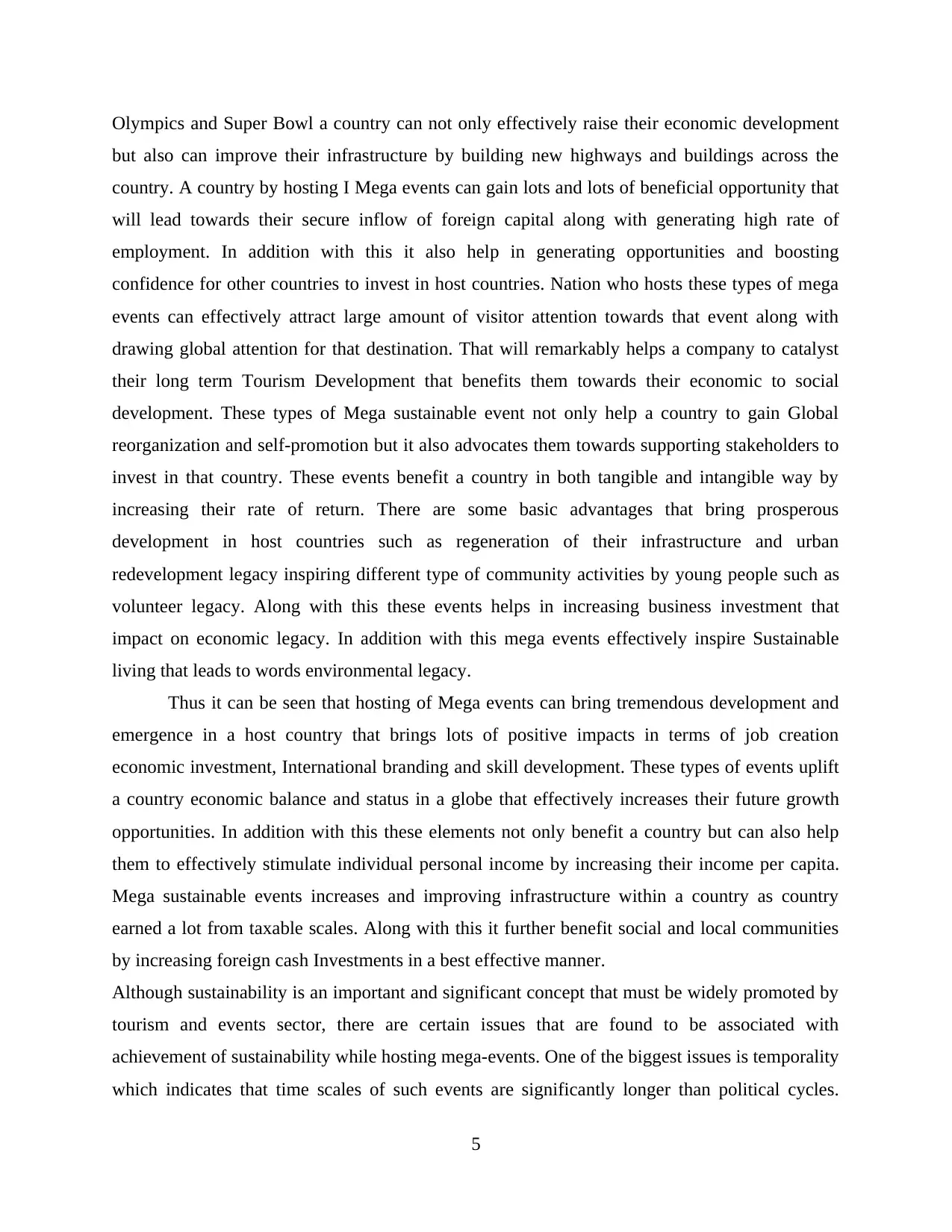
Olympics and Super Bowl a country can not only effectively raise their economic development
but also can improve their infrastructure by building new highways and buildings across the
country. A country by hosting I Mega events can gain lots and lots of beneficial opportunity that
will lead towards their secure inflow of foreign capital along with generating high rate of
employment. In addition with this it also help in generating opportunities and boosting
confidence for other countries to invest in host countries. Nation who hosts these types of mega
events can effectively attract large amount of visitor attention towards that event along with
drawing global attention for that destination. That will remarkably helps a company to catalyst
their long term Tourism Development that benefits them towards their economic to social
development. These types of Mega sustainable event not only help a country to gain Global
reorganization and self-promotion but it also advocates them towards supporting stakeholders to
invest in that country. These events benefit a country in both tangible and intangible way by
increasing their rate of return. There are some basic advantages that bring prosperous
development in host countries such as regeneration of their infrastructure and urban
redevelopment legacy inspiring different type of community activities by young people such as
volunteer legacy. Along with this these events helps in increasing business investment that
impact on economic legacy. In addition with this mega events effectively inspire Sustainable
living that leads to words environmental legacy.
Thus it can be seen that hosting of Mega events can bring tremendous development and
emergence in a host country that brings lots of positive impacts in terms of job creation
economic investment, International branding and skill development. These types of events uplift
a country economic balance and status in a globe that effectively increases their future growth
opportunities. In addition with this these elements not only benefit a country but can also help
them to effectively stimulate individual personal income by increasing their income per capita.
Mega sustainable events increases and improving infrastructure within a country as country
earned a lot from taxable scales. Along with this it further benefit social and local communities
by increasing foreign cash Investments in a best effective manner.
Although sustainability is an important and significant concept that must be widely promoted by
tourism and events sector, there are certain issues that are found to be associated with
achievement of sustainability while hosting mega-events. One of the biggest issues is temporality
which indicates that time scales of such events are significantly longer than political cycles.
5
but also can improve their infrastructure by building new highways and buildings across the
country. A country by hosting I Mega events can gain lots and lots of beneficial opportunity that
will lead towards their secure inflow of foreign capital along with generating high rate of
employment. In addition with this it also help in generating opportunities and boosting
confidence for other countries to invest in host countries. Nation who hosts these types of mega
events can effectively attract large amount of visitor attention towards that event along with
drawing global attention for that destination. That will remarkably helps a company to catalyst
their long term Tourism Development that benefits them towards their economic to social
development. These types of Mega sustainable event not only help a country to gain Global
reorganization and self-promotion but it also advocates them towards supporting stakeholders to
invest in that country. These events benefit a country in both tangible and intangible way by
increasing their rate of return. There are some basic advantages that bring prosperous
development in host countries such as regeneration of their infrastructure and urban
redevelopment legacy inspiring different type of community activities by young people such as
volunteer legacy. Along with this these events helps in increasing business investment that
impact on economic legacy. In addition with this mega events effectively inspire Sustainable
living that leads to words environmental legacy.
Thus it can be seen that hosting of Mega events can bring tremendous development and
emergence in a host country that brings lots of positive impacts in terms of job creation
economic investment, International branding and skill development. These types of events uplift
a country economic balance and status in a globe that effectively increases their future growth
opportunities. In addition with this these elements not only benefit a country but can also help
them to effectively stimulate individual personal income by increasing their income per capita.
Mega sustainable events increases and improving infrastructure within a country as country
earned a lot from taxable scales. Along with this it further benefit social and local communities
by increasing foreign cash Investments in a best effective manner.
Although sustainability is an important and significant concept that must be widely promoted by
tourism and events sector, there are certain issues that are found to be associated with
achievement of sustainability while hosting mega-events. One of the biggest issues is temporality
which indicates that time scales of such events are significantly longer than political cycles.
5
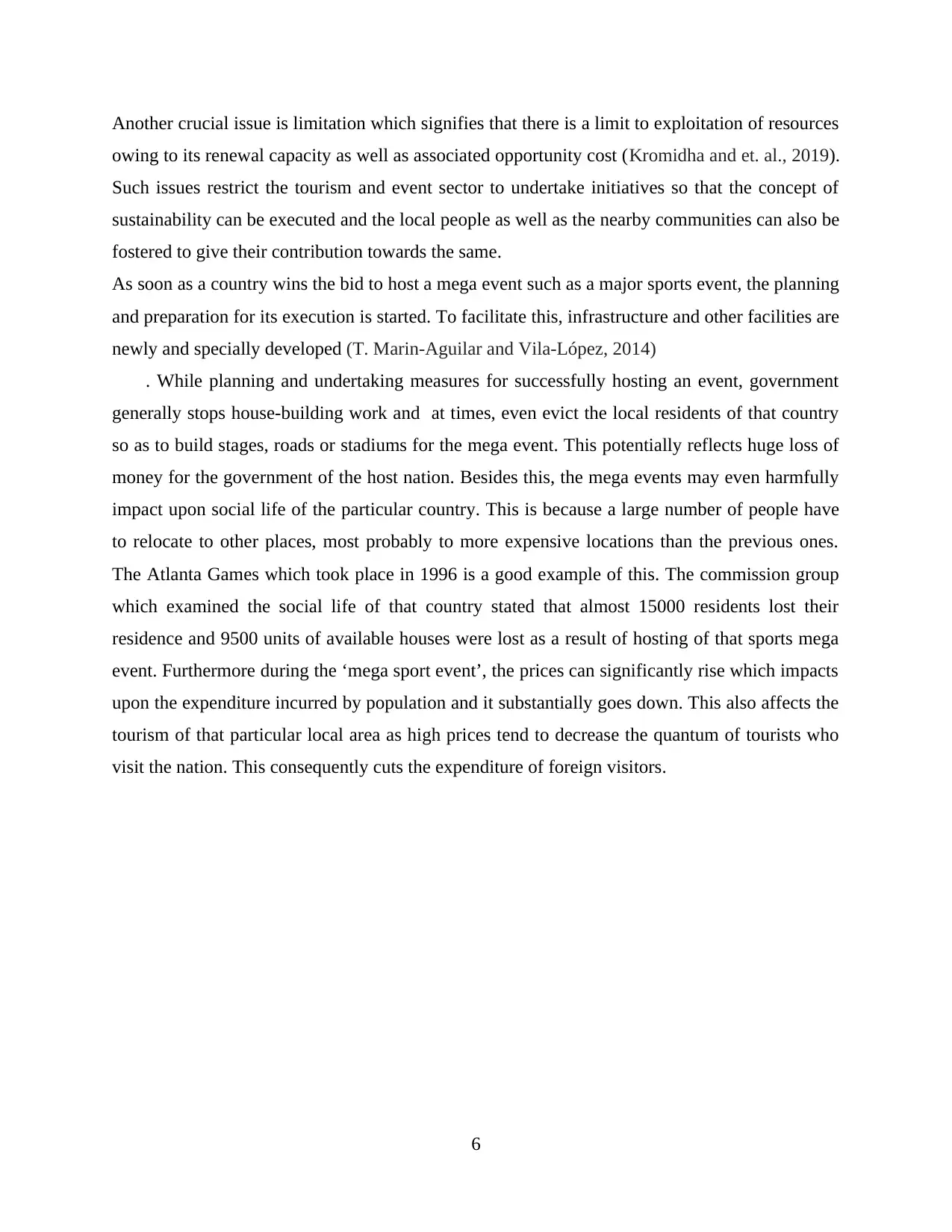
Another crucial issue is limitation which signifies that there is a limit to exploitation of resources
owing to its renewal capacity as well as associated opportunity cost (Kromidha and et. al., 2019).
Such issues restrict the tourism and event sector to undertake initiatives so that the concept of
sustainability can be executed and the local people as well as the nearby communities can also be
fostered to give their contribution towards the same.
As soon as a country wins the bid to host a mega event such as a major sports event, the planning
and preparation for its execution is started. To facilitate this, infrastructure and other facilities are
newly and specially developed (T. Marin-Aguilar and Vila-López, 2014)
. While planning and undertaking measures for successfully hosting an event, government
generally stops house-building work and at times, even evict the local residents of that country
so as to build stages, roads or stadiums for the mega event. This potentially reflects huge loss of
money for the government of the host nation. Besides this, the mega events may even harmfully
impact upon social life of the particular country. This is because a large number of people have
to relocate to other places, most probably to more expensive locations than the previous ones.
The Atlanta Games which took place in 1996 is a good example of this. The commission group
which examined the social life of that country stated that almost 15000 residents lost their
residence and 9500 units of available houses were lost as a result of hosting of that sports mega
event. Furthermore during the ‘mega sport event’, the prices can significantly rise which impacts
upon the expenditure incurred by population and it substantially goes down. This also affects the
tourism of that particular local area as high prices tend to decrease the quantum of tourists who
visit the nation. This consequently cuts the expenditure of foreign visitors.
6
owing to its renewal capacity as well as associated opportunity cost (Kromidha and et. al., 2019).
Such issues restrict the tourism and event sector to undertake initiatives so that the concept of
sustainability can be executed and the local people as well as the nearby communities can also be
fostered to give their contribution towards the same.
As soon as a country wins the bid to host a mega event such as a major sports event, the planning
and preparation for its execution is started. To facilitate this, infrastructure and other facilities are
newly and specially developed (T. Marin-Aguilar and Vila-López, 2014)
. While planning and undertaking measures for successfully hosting an event, government
generally stops house-building work and at times, even evict the local residents of that country
so as to build stages, roads or stadiums for the mega event. This potentially reflects huge loss of
money for the government of the host nation. Besides this, the mega events may even harmfully
impact upon social life of the particular country. This is because a large number of people have
to relocate to other places, most probably to more expensive locations than the previous ones.
The Atlanta Games which took place in 1996 is a good example of this. The commission group
which examined the social life of that country stated that almost 15000 residents lost their
residence and 9500 units of available houses were lost as a result of hosting of that sports mega
event. Furthermore during the ‘mega sport event’, the prices can significantly rise which impacts
upon the expenditure incurred by population and it substantially goes down. This also affects the
tourism of that particular local area as high prices tend to decrease the quantum of tourists who
visit the nation. This consequently cuts the expenditure of foreign visitors.
6
⊘ This is a preview!⊘
Do you want full access?
Subscribe today to unlock all pages.

Trusted by 1+ million students worldwide
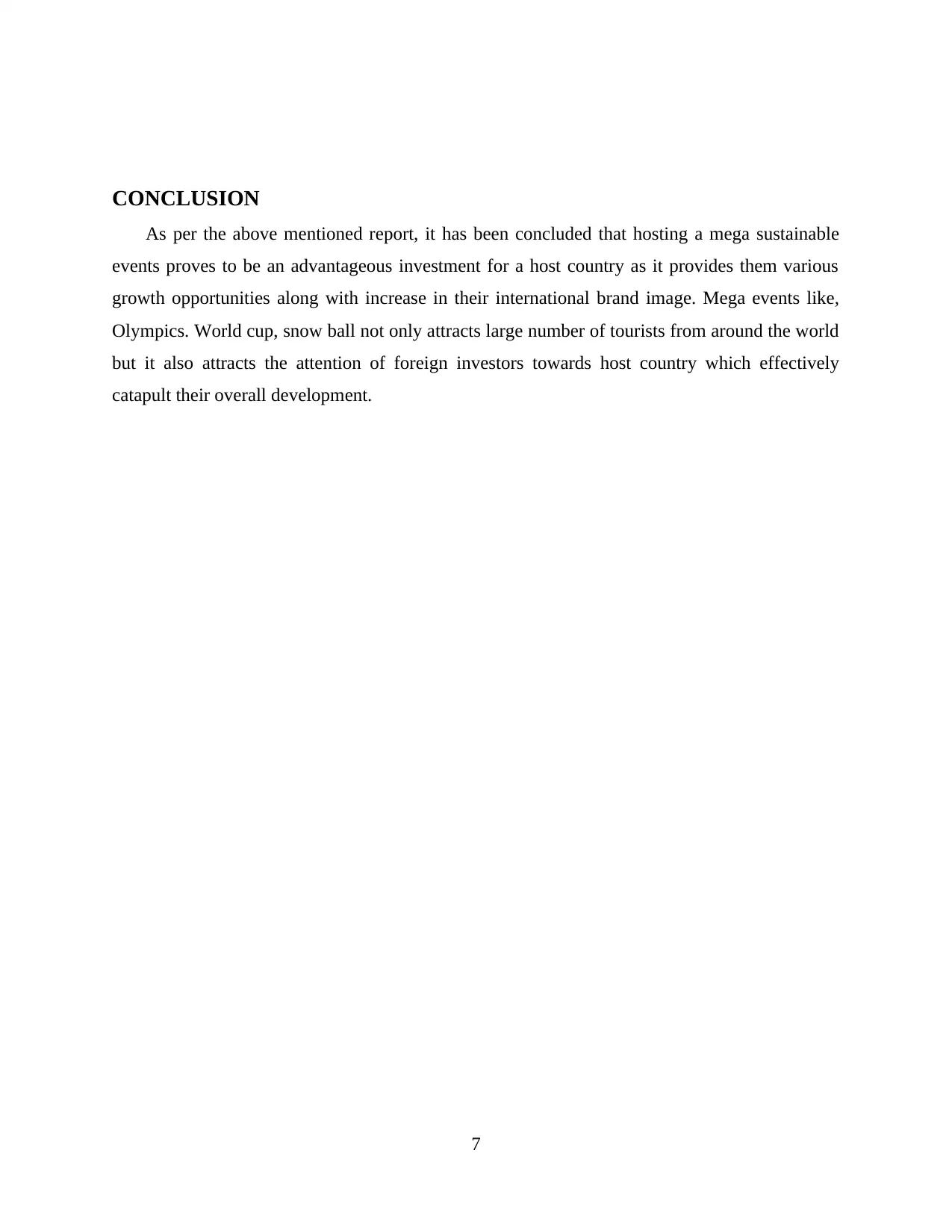
CONCLUSION
As per the above mentioned report, it has been concluded that hosting a mega sustainable
events proves to be an advantageous investment for a host country as it provides them various
growth opportunities along with increase in their international brand image. Mega events like,
Olympics. World cup, snow ball not only attracts large number of tourists from around the world
but it also attracts the attention of foreign investors towards host country which effectively
catapult their overall development.
7
As per the above mentioned report, it has been concluded that hosting a mega sustainable
events proves to be an advantageous investment for a host country as it provides them various
growth opportunities along with increase in their international brand image. Mega events like,
Olympics. World cup, snow ball not only attracts large number of tourists from around the world
but it also attracts the attention of foreign investors towards host country which effectively
catapult their overall development.
7
Paraphrase This Document
Need a fresh take? Get an instant paraphrase of this document with our AI Paraphraser
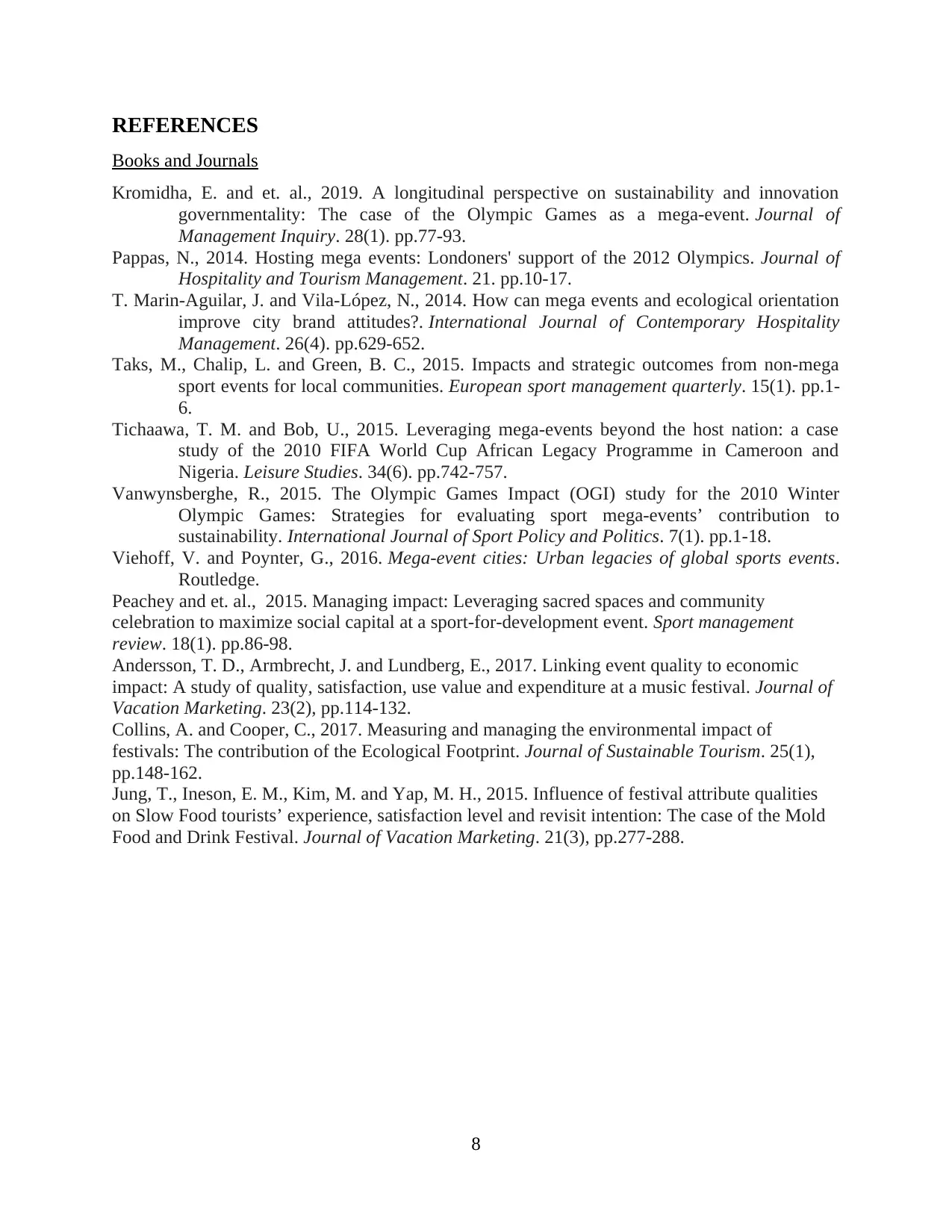
REFERENCES
Books and Journals
Kromidha, E. and et. al., 2019. A longitudinal perspective on sustainability and innovation
governmentality: The case of the Olympic Games as a mega-event. Journal of
Management Inquiry. 28(1). pp.77-93.
Pappas, N., 2014. Hosting mega events: Londoners' support of the 2012 Olympics. Journal of
Hospitality and Tourism Management. 21. pp.10-17.
T. Marin-Aguilar, J. and Vila-López, N., 2014. How can mega events and ecological orientation
improve city brand attitudes?. International Journal of Contemporary Hospitality
Management. 26(4). pp.629-652.
Taks, M., Chalip, L. and Green, B. C., 2015. Impacts and strategic outcomes from non-mega
sport events for local communities. European sport management quarterly. 15(1). pp.1-
6.
Tichaawa, T. M. and Bob, U., 2015. Leveraging mega-events beyond the host nation: a case
study of the 2010 FIFA World Cup African Legacy Programme in Cameroon and
Nigeria. Leisure Studies. 34(6). pp.742-757.
Vanwynsberghe, R., 2015. The Olympic Games Impact (OGI) study for the 2010 Winter
Olympic Games: Strategies for evaluating sport mega-events’ contribution to
sustainability. International Journal of Sport Policy and Politics. 7(1). pp.1-18.
Viehoff, V. and Poynter, G., 2016. Mega-event cities: Urban legacies of global sports events.
Routledge.
Peachey and et. al., 2015. Managing impact: Leveraging sacred spaces and community
celebration to maximize social capital at a sport-for-development event. Sport management
review. 18(1). pp.86-98.
Andersson, T. D., Armbrecht, J. and Lundberg, E., 2017. Linking event quality to economic
impact: A study of quality, satisfaction, use value and expenditure at a music festival. Journal of
Vacation Marketing. 23(2), pp.114-132.
Collins, A. and Cooper, C., 2017. Measuring and managing the environmental impact of
festivals: The contribution of the Ecological Footprint. Journal of Sustainable Tourism. 25(1),
pp.148-162.
Jung, T., Ineson, E. M., Kim, M. and Yap, M. H., 2015. Influence of festival attribute qualities
on Slow Food tourists’ experience, satisfaction level and revisit intention: The case of the Mold
Food and Drink Festival. Journal of Vacation Marketing. 21(3), pp.277-288.
8
Books and Journals
Kromidha, E. and et. al., 2019. A longitudinal perspective on sustainability and innovation
governmentality: The case of the Olympic Games as a mega-event. Journal of
Management Inquiry. 28(1). pp.77-93.
Pappas, N., 2014. Hosting mega events: Londoners' support of the 2012 Olympics. Journal of
Hospitality and Tourism Management. 21. pp.10-17.
T. Marin-Aguilar, J. and Vila-López, N., 2014. How can mega events and ecological orientation
improve city brand attitudes?. International Journal of Contemporary Hospitality
Management. 26(4). pp.629-652.
Taks, M., Chalip, L. and Green, B. C., 2015. Impacts and strategic outcomes from non-mega
sport events for local communities. European sport management quarterly. 15(1). pp.1-
6.
Tichaawa, T. M. and Bob, U., 2015. Leveraging mega-events beyond the host nation: a case
study of the 2010 FIFA World Cup African Legacy Programme in Cameroon and
Nigeria. Leisure Studies. 34(6). pp.742-757.
Vanwynsberghe, R., 2015. The Olympic Games Impact (OGI) study for the 2010 Winter
Olympic Games: Strategies for evaluating sport mega-events’ contribution to
sustainability. International Journal of Sport Policy and Politics. 7(1). pp.1-18.
Viehoff, V. and Poynter, G., 2016. Mega-event cities: Urban legacies of global sports events.
Routledge.
Peachey and et. al., 2015. Managing impact: Leveraging sacred spaces and community
celebration to maximize social capital at a sport-for-development event. Sport management
review. 18(1). pp.86-98.
Andersson, T. D., Armbrecht, J. and Lundberg, E., 2017. Linking event quality to economic
impact: A study of quality, satisfaction, use value and expenditure at a music festival. Journal of
Vacation Marketing. 23(2), pp.114-132.
Collins, A. and Cooper, C., 2017. Measuring and managing the environmental impact of
festivals: The contribution of the Ecological Footprint. Journal of Sustainable Tourism. 25(1),
pp.148-162.
Jung, T., Ineson, E. M., Kim, M. and Yap, M. H., 2015. Influence of festival attribute qualities
on Slow Food tourists’ experience, satisfaction level and revisit intention: The case of the Mold
Food and Drink Festival. Journal of Vacation Marketing. 21(3), pp.277-288.
8

9
⊘ This is a preview!⊘
Do you want full access?
Subscribe today to unlock all pages.

Trusted by 1+ million students worldwide
1 out of 9
Related Documents
Your All-in-One AI-Powered Toolkit for Academic Success.
+13062052269
info@desklib.com
Available 24*7 on WhatsApp / Email
![[object Object]](/_next/static/media/star-bottom.7253800d.svg)
Unlock your academic potential
Copyright © 2020–2026 A2Z Services. All Rights Reserved. Developed and managed by ZUCOL.




